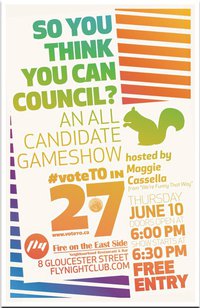 Back before Pride Toronto made its controversial decision to ban two words from this year’s parade, I made clear the reasons why I opposed such a move. Since then I have done a lot of listening and a lot of thinking, and, apparently, so has Pride. Yesterday they announced that they are reversing their decision to be the judges of what language can or can’t be used in the parade, requiring only that participants agree to abide by the city’s non-discrimination policy.
Back before Pride Toronto made its controversial decision to ban two words from this year’s parade, I made clear the reasons why I opposed such a move. Since then I have done a lot of listening and a lot of thinking, and, apparently, so has Pride. Yesterday they announced that they are reversing their decision to be the judges of what language can or can’t be used in the parade, requiring only that participants agree to abide by the city’s non-discrimination policy.
The board members of Pride Toronto are to be congratulated for having the courage to change their minds, and a special thanks goes to the community members including Brent Hawkes, Doug Elliott, Doug Kerr, Michael Went, Maura Lawless and others who worked to build bridges and come to this agreement.
As Glen Murray points out this morning on Facebook, the most important thing now is the second part of Pride Toronto’s decision, to “appoint a panel of LGBTTIQQ2SA leaders and friends to recommend a policy to protect and advance the qualities of Pride and ensure it is true to its core values and principles” with a mandate to “consult with the community to develop recommendations to ensure a Pride that values and promotes freedom of speech and individual expression, inclusiveness and respect, pluralism and diversity, equity and fairness, celebration, humour and fun.”
This addresses the two main concerns I expressed to Torontoist earlier this month, saying “The [Pride] Board did not pass a comprehensive anti-discrimination policy… the decision was ad hoc. Had they gone through an open process, there would not be such anger.” Now we will hopefully have both a comprehensive policy and an open process to create it.
Now it’s time to move forward together, recognizing that while the decision that Pride Toronto originally came to was wrong, there are also some members of the LGBT community who have not felt, as Pride’s slogan puts it, like they “belong” due to language they perceive to be hurtful and even threatening. Let’s be clear, I’m not just talking about lobbyists and activists with a public profile. There are many people I’ve spoken with while knocking on doors who have told me they no longer feel welcome at Pride, and that’s a real concern. Creating an environment where everyone feels a sense of safety and belonging while also allowing a diversity of voices is the challenge, and I’m optimistic that Pride has created the right process to meet it.
